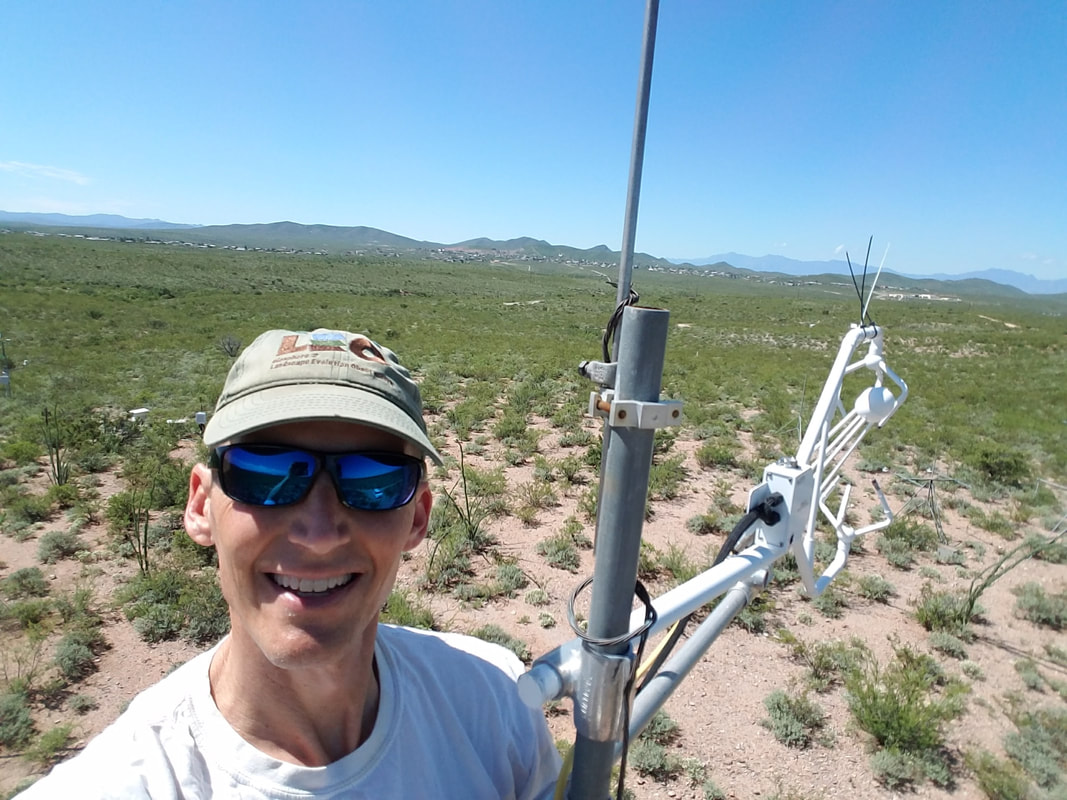The study of the interactions between plants and the water cycle.
What are your undergraduate and graduate degrees in?
University of Arizona Hydrology and Water Resources Ph.D.
Massachusetts Institute of Technology Civil and Environmental Eng./Hydrology M.S.
Colorado State University Mathematics/Philosophy B.S.
How did you arrive at working in/thinking about ecohydrology?
My educational lineage began with Dara Entekhabi (MIT) and Randy Koster (NASA), who were direct disciples of the Grand Master of theoretical ecohydrology, Peter Eagleson (MIT). I learned from them about the interactions between hydrology and the climate. We looked at how different mathematical descriptions of the land surface in climate models affected land surface and climate memory. More “realistic” models that explicitly accounted for precipitation interception, i.e. by plant canopies, and its subsequent “fast” evaporation back to the atmosphere imparted less memory to the climate than traditional bucket models.
I moved to Arizona to work on more regional problems and learn how to collect data from the field from a wonderful mentor, David Goodrich (USDA-ARS). I was also fortunate enough to run into another Master, Jim Shuttleworth, who took me under his wing at the University of Arizona. I learned micrometeorology from him and started making my own measurements of land surface fluxes, ultimately shedding light on how riparian ecosystem water use, photosynthesis and respiration were influenced by how well the plants were tapped into groundwater.
A big technological development came along when I was a graduate student: low-power, fast-response gas analyzers coupled with low-power dataloggers that can store the data. Thank you Campbell Scientific and LiCor! This meant we could start making measurements where we don’t have line power and having gas analyzers that could measure both carbon dioxide and water vapor. The later meant I had to learn something about carbon dioxide fluxes, further cementing my ecohydrological interests.
What do you see as an important emerging area of ecohydrology?
We are seeing new ways to partition measured evapotranspiration into its evaporation and transpiration sources. Combining this with the ton of available eddy covariance water and carbon fluxes like that from AmeriFlux allow us a whole new look into ecosystem-scale plant-water interactions, being able to see what the plants are doing separately.
Do you have a favorite ecohydrology paper? Describe/explain.
Noy-Meir, Imanuel. "Desert ecosystems: environment and producers." Annual review of ecology and systematics 4.1 (1973): 25-51.
The water limitation in desert environments really brings out the linkages between ecosystems and their hydrology. This paper highlights so many ecohydrological processes that we are still working to understand today. The great thing is that we now have the data to do that.
Huxman, Travis E., Keirith A. Snyder, David Tissue, A. Joshua Leffler, Kiona Ogle, William T. Pockman, Darren R. Sandquist, Daniel L. Potts, and Susan Schwinning. "Precipitation pulses and carbon fluxes in semiarid and arid ecosystems." Oecologia 141, no. 2 (2004): 254-268.
I have to laugh as I remember the first time I saw this work on a poster I thought to myself, “Is that all?” This is not the first time, my first impressions about a paper were wrong. Fifteen years later, I’ve probably cited this paper more than a hundred times. It does such a great job of synthesizing the literature on ecosystem metabolic responses to intermittent pulses of water, and it lays out some many new hypotheses that we’ve been trying to test ever since.
What do you do for fun (apart from ecohydrology)?
I love rambling around outside whether that is on foot, wheels or skis. If there are mountains and a friend or two around, then I’m even happier.

 RSS Feed
RSS Feed